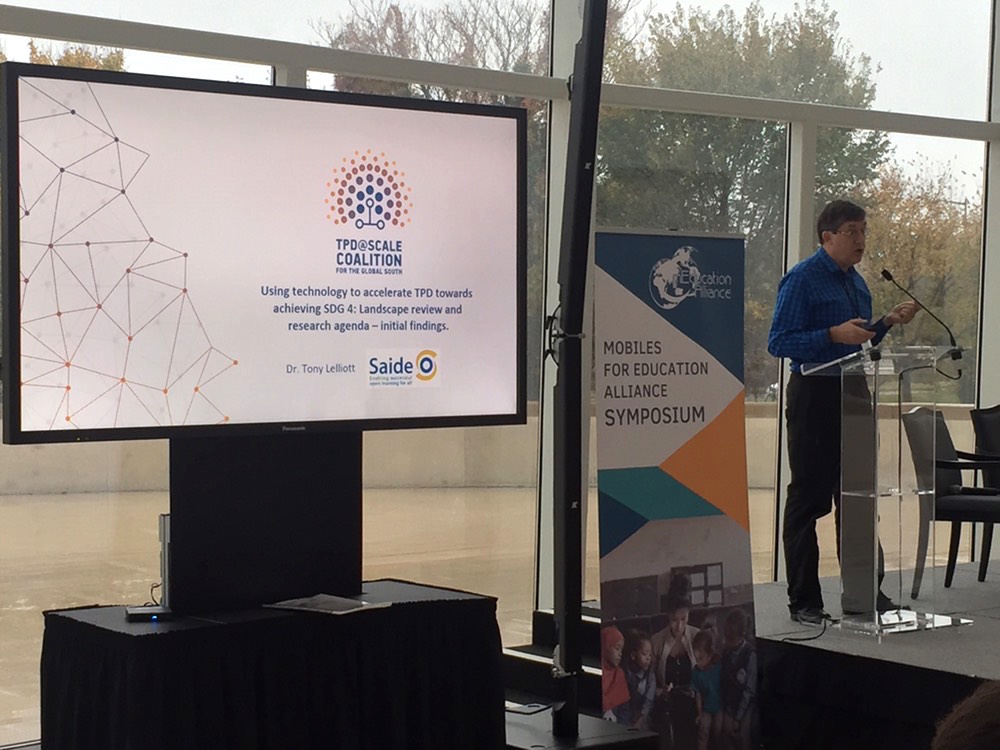The Coalition led two special sessions at the 8th Annual Mobiles for Education Alliance Symposium, held at the United States Institute of Peace, Washington, D.C. from November 6 to 8, 2018, a yearly gathering of education technology innovators, practitioners, policymakers, and funders.
The Coalition opened the Symposium with a special plenary session on TPD@Scale led by Tony Lelliott, Project Lead of the Coalition-commissioned landscape review and research agenda-setting on TPD@Scale, and moderated by Cher Ping Lim, Coalition Research and Development Manager. Dr. Lelliott presented preliminary findings from the landscape review, highlighting several issues identified through the analysis of cases: access to technology; the need for strategic partnerships and professional learning communities; the value of open education resources; the need for massive open online courses (MOOCs) to have appropriate pedagogies; recognition and incentivization; and the importance of blended methods of delivery. Dr. Lelliot also led the plenary audience in a brainstorming activity that yielded about 60 research questions for the research agenda and nearly 30 TPD projects for consideration in the landscape review.
On Day 2 of the Symposium, Prof. Lim facilitated a deeper dive into TPD@Scale that featured four presentations:
- Diana Laurillard, Professor of Learning with Digital Technology, and Eileen Kennedy, Senior Research Associate, both at University College London, presented a two-step cascade model that offers TPD via MOOC platforms to support teachers and professionals working in contexts where the education technology infrastructure is minimal or absent. Large-scale online platforms are used to orchestrate the collaborative development of new knowledge by the teaching community on enhancing education for local groups, including the use of digital methods where available. Prof. Laurillard and Dr. Kennedy showcased the co-design of MOOCs by teachers of refugee communities in Lebanon. “We contrast the now discredited top-down ‘cascade’ model with an alternative model we are exploring: the ‘local inclusion’ model,” Prof. Laurillard explained. “The MOOCs, which we are co-designing with our partners and contributors in Lebanon, will reflect their needs and share their methods and successes. It’s our job to help the paraprofessionals in the refugee communities to collaborate and share their professional knowledge and build it further.”
- Simon Cross, Lecturer at the Institute of Education Technology, Open University, gave a presentation on “Transforming classroom observation and professional development with 360-degree video and mobile VR.” Dr. Cross asserted that one of the problems of teacher professional development is the lack of solution-building from the teachers’ perspective or with the technology they own. “We need to enthuse, engage, and give control,” he argued. “The UK Open University’s TESS-India program remains committed to supporting innovative and emerging opportunities for transforming teaching practice. This new project aims to deliver research-validated practical approaches and a conceptual framework to use 360-degree video recording and smartphone-driven mobile VR viewing for teacher training and professional development. Building on fieldwork undertaken in rural India, considerations of scalability are essential even at project conception.”
- A second presentation from the TESS-India team, “Personalised teacher professional learning: A holistic approach using tablets,” by Freda Wolfenden, Professor of Education and International Development at the Open University, was delivered by Dr. Cross on Prof. Wolfenson’s behalf. This presentation drew insights from three low resource sites – Ghana, India, and Nigeria – where teacher educators have been using tablets in school and college classrooms. Data analysis revealed how participation with the tablet transforms teacher educators’ professional identity and shifts their dialogue with teachers towards more formative feedback. Interactional data from the tablets help teachers develop their understanding of how ways of knowing develop in different classroom situations and is valuable in setting targets for teachers. Reached for additional comment, Prof. Wolfenden noted that “[o]ne of the distinguishing features of the TESS-India approach is our attention to teacher educators, both those working in local teacher or resource centers and those in teacher education institutions, as well as teachers. This arose from our early work with teacher educators where we realized many had few opportunities for engaging in dialogue about practice with teachers in schools, and those teacher educators based in institutions were often not familiar with the classroom conditions in their locality. Video recordings of classroom practice on phones and tablets are showing promise as mediating objects to promote such dialogue between teachers and teacher educators and consequent mutual shifts in practice.”
- Victoria L. Tinio, Executive Director of the Foundation for Information Technology Education and Development and Secretariat Director of the Coalition, presented findings from the TPD@Scale Philippines pilot called ELLN Digital. Ms. Tinio described the blended learning model piloted by FIT-ED with the Philippine Department of Education from 2015-2017. The pilot run involved around 4,000 K to 3 teachers in 240 primary schools all over the country. The model combines guided self-learning using multimedia courseware, classroom application, and face-to-face co-learning in a school-based learning community. A national scale up to over 300,000 teachers in 38,000 schools is currently being undertaken by the Department. In discussing the results of an independent evaluation of the pilot, Ms. Tinio highlighted key issues and challenges as the model is taken to scale: “The results were promising–a small but significant gain in teachers’ content and pedagogical knowledge from pre-test to post-test was observed and the teacher response was overwhelmingly positive. But three key areas of improvement need to be addressed in the scale-up phase: differentiating instruction, learner support, and assessment.”

